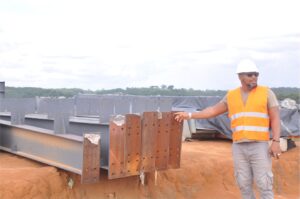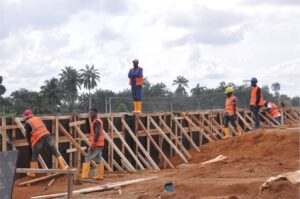
Mimshac Automobile Company, in partnership with an Israeli company, Merkavin Automobile Technologies Company, is setting up an automobile assembling plant in Nigeria’s oil-rich state, Akwa Ibom. Designed to be the largest in the African continent in terms of output, the facility has lofty promises for the state, the country and Africa. Our reporter, Ofonime Honesty, writes.
Akwa Ibom is a state in the southern region of Nigeria. Carved out of old Cross River State on September 23, 1987, during the military regime of General Ibrahim Babangida, the state will clock 33 on Wednesday, September 23, 2020.
The state is currently governed by Mr. Udom Emmanuel, a banker who assumed the reins of power as state governor in 2015. Industrialization has been a recurring term in his administration.
Groundbreaking of the site of the automobile plant was done by the governor on July 13, 2015.
Related: Akwa Ibom 33rd Anniversary: Gov Emmanuel Leads Citizens In Thanksgiving

“We stand ready and committed to provide jobs for the people of Akwa Ibom State. The site will represent the first chapter in the book of industrialization we have opened today”, Emmanuel proclaimed on the day.
He was barely a month and a half old in office as governor.
Five years later, after bureaucratic hurdles occasioned by authorizations and related paper-works were overcome, construction work is progressing.
Prefabricated structures, machines and all kinds of equipment having arrived from Israel are currently being coupled.
“Manufacturing operations will commence in the first quarter of 2021”, chief executive officer (CEO) of the company, Mr. Valentino Okorie, told this reporter when he toured the facility.
Related: Osinbajo Gives Thumbs Up To Gov Emmanuel Over Industrialization

Located on a large expanse of land measuring 18 hectares, freely donated by the Akwa Ibom State Government via the host community, Ikot Ukap in Itu Local Government Area, is the first of its kind in Nigeria’s Niger Delta region.
It is a private investment facilitated by Mimshac Automobile Company, in partnership with Merkavin Automobile Technologies Company, a prominent Israeli automobile manufacturer.
“We will produce utility vehicles, luxury buses, firefighting trucks, ambulances, waste disposal trucks, in fact, all kinds of automobiles,” Okorie disclosed.
He added that the plant is designed to be multidimensional: “After the first phase of takeoff, we plan to integrate other things like production of brake pads, filter, tyres and other vehicle parts. We will venture into transportation business with transit stations and refueling points throughout the state and the federation. We will also operate automobile repairs with our workshops scattered throughout the country.”
Hinting that the facility has the capacity of directly and indirectly employing around 5000 persons on takeoff, Okorie said 20 pioneer staff sent from Akwa Ibom to Israel would soon round off their training.
When quizzed on the quality of the company’s products, Okorie said Israeli-based technology has earned global trust, and assured that their products will stand the test of time.
As at the time of filing this report, the company’s clinic comprising of consultation room, nursing bay, theatre, rest rooms, private wards and other facilities had been completed.

Other structures and facilities like the administrative block, car park, electricity transformer, perimeter fencing and staff quarters have been put in place as well.
Construction work is currently being done on the two assembling halls which according to the CEO are equivalent to two standard football pitches.
Promising that the plant would help boost the state and the country’s economy as well as reduce unemployment, Okorie revealed that their master plan, when fully implemented, would see them become Africa’s largest automobile manufacturers.
“For professional reasons, I will not reveal everything to you. What we have on the master plan is massive, once it is fully implemented, we should be the largest automobile manufacturer in Africa,” he declared.
Governor Udom Emmanuel’s senior special assistant on technical matters and due process, Elder Ufot Ebong, reiterated that the facility would create massive jobs and boost the state’s economy.
He was addressing newsmen in August when he took delivery of consignment of equipment from Israel for the plant.
Elder Ebong thanked Governor Emmanuel for making the state ripe for investors.
He said, “Governor Udom Emmanuel has been doing everything unique to ensure that the factory thrives.”
*Situation Report on Nigeria’s Automobile Industry
The origin of Nigeria’s automobile industry is traceable to the late 50s and early 60s.
Nairametrics, a business reports website, notes that, “private companies pioneered the establishment of local automobile assembling plants using completely/semi knocked-down parts. The Federal Government became involved in the local automobile production 10 years later after concluding agreements with automobile manufacturers in Europe.”
However, in the 70s, Nigeria deliberately but dangerously became a mono-product economy, abandoning other vibrant sectors and depending solely on crude oil exportation – a trend which has remained largely unchanged till date.
The nation’s abandonment of the local industry led to mounting importation of global automobile brands.
In recent times, indigenous automobile manufacturing industry has shown signs of resuscitation albeit at a slow pace. Nigeria is a member of the Africa Association of Automotive Manufacturers (AAAM).
Formed in 2015, the association aims to be Africa’s most vibrant umbrella body of automobile manufacturers by reviving the continent’s ailing auto industry via creating the right policy and investment environment for the sector to thrive.
One of the organization’s first ports of call was Nigeria where Federal Government officials promised the administration’s preparedness to partner them.
AAAM and other sister organizations, however, face an uphill task to revolutionalize the sector.
The signs are promising, but challenges are mounting. Africa and Nigeria’s weak economy, weak manufacturing infrastructure, weak quality control and weak capital for indigenous auto makers have all contributed to the flooding of the market with imported cars (mostly used, or Tokunbo in Nigerian parlance).
Africa, due to weak or nonexistent quality control, is a dumping ground for low standard and refurbished aged vehicles from Asia, Europe and other parts of the globe.
Also, manufacturing vehicles from the scratch to completion remains an unreached goal in Nigeria and most parts of Africa.
Famous indigenous auto maker, Innoson Vehicle Manufacturing Plant, domiciled in Nnewi, Anambra State, assembles trucks and buses with Completely Knocked-Down (CKD) kits with engines, gear boxes and electrical parts imported from overseas.
With the Akwa Ibom-domiciled Mimshac Automobile Company planning to manufacture vehicles alongside its parts, its claim of emerging as Africa’s largest automaker appears concrete.
A vacuum is there to be filled. A gargantuan business opportunity is there to be exploited.
All eyes on Mimshac Automobile Company!




